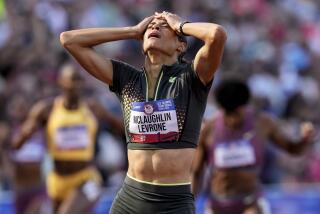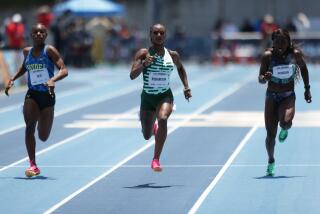A Hurdle Too Tough for Moses
- Share via
For the man who has everything--two Olympic gold medals, the world record and a nine-year winning streak--winning the overall championship in the Mobil Grand Prix would seem like a modest goal.
But Edwin Moses was determined to do it this summer, if for no other reason, because it was there. Actually, there was one other reason, a $35,000 check, although, considering Moses’ income bracket, that didn’t mean as much to him as it would to most other track and field athletes.
Now, with Moses’ controversial withdrawal from the Grand Prix finals today in Rome, the money will go to one of the other athletes, perhaps even to one of the other 400-meter intermediate hurdlers.
The irony of that possibility hasn’t been lost on Moses, who has been virtually unchallenged on the track this summer. His closest rivals, Americans Andre Phillips and Danny Harris and West German Harald Schmid, appear to be avoiding Moses. As a result, he hasn’t had to look back in any of his nine races while extending his winning streak since August of 1977 to 103 finals.
That does not mean Moses hasn’t faced hurdles.
Only last week, he learned that the promoter of last Sunday’s meet in Rieti, Italy, had canceled Moses’ event.
Speaking Tuesday from his in-laws’ home in West Berlin, Moses said the promoter, Sandro Giovannelli, explained that he didn’t want the hurdler to risk injury so soon before the main event of the 16-meet Grand Prix circuit, the Rome finals.
Moses said it was his impression that Giovannelli was acting upon instructions from Primo Nebiolo, president of the International Amateur Athletic Federation. The IAAF is the international governing body for track and field. Nebiolo also is Italian.
“I could have understood his reasoning if several races had been pulled from Rieti,” Moses said. “But why was it just the 400 hurdles? If they were worried about people getting hurt, why even have the meet? Something peculiar is going on.”
Moses, who ran the fastest time of the year, 47.38, in his most recent race, Sept. 2 in Lausanne, Switzerland, said that, even though the Rieti meet was not part of the Grand Prix schedule, he felt he needed to run there in order to be at his best in Rome.
If the conditions had been right for today’s finals at the Olympic Stadium, he said he believes he could have broken his world record of 47.02, thus giving him enough Grand Prix points to overtake the leaders, Moroccan middle-distance runner Said Aouita, American high jumper Jimmy Howard and Harris. Bulgarian high hurdler Yordanka Donkova and Romanian middle-distance runner Maricica Puica are tied for the women’s lead.
Under the circumstances, however, Moses said he believes he would not have broken the record in Rome without a tune-up in Rieti and decided to withdraw from the finals.
Moses said Nebiolo’s assistant, Luciano Barro, responded by offering the hurdler $35,000 to run in Rome, the amount he would have earned by winning the overall championship. In addition, Moses said another Italian promoter offered him between $10,000 and $15,000 to run next weekend in Sardinia, which Moses said he considered as further enticement to compete in Rome.
Barro’s alleged offer is inconsistent with IAAF claims that athletes aren’t paid appearance fees for competing in the Grand Prix finals. Barro could not be reached for comment.
“He said he thought money was the issue,” Moses said. “I told him that my chance to win the Grand Prix was the issue. My one goal this year was to win the Grand Prix legitimately. “There was no way I was going to take money under the table, not when the other athletes weren’t supposed to be getting any. It wasn’t fair to put me in that position, and it wasn’t fair to the other athletes.”
But if money wasn’t the issue for Moses in Rome, it has been on at least a couple of other occasions this summer, so much so that he has accused some European promoters of conspiring against him.
While the hurdler’s appearance fee for the larger meets since 1984 has been $25,000, European promoters last year agreed to pay no more than $15,000 to athletes such as Carl Lewis, Steve Cram, Sebastian Coe, Aouita and Moses. Moses was not affected in 1985 because he missed the entire season with a knee injury.
Through negotiations, Moses has gotten his price in most meets this summer. His contract negotiator, Gordon Baskin, said Moses has had his best summer ever financially.
But in attempting to place Moses in meets in Cologne and Brussels, the final two Grand Prix meets before Rome and meets the hurdler needed in order to add to his point totals, Baskin said the promoters would not budge from their original offers of $10,000.
More to Read
Go beyond the scoreboard
Get the latest on L.A.'s teams in the daily Sports Report newsletter.
You may occasionally receive promotional content from the Los Angeles Times.






